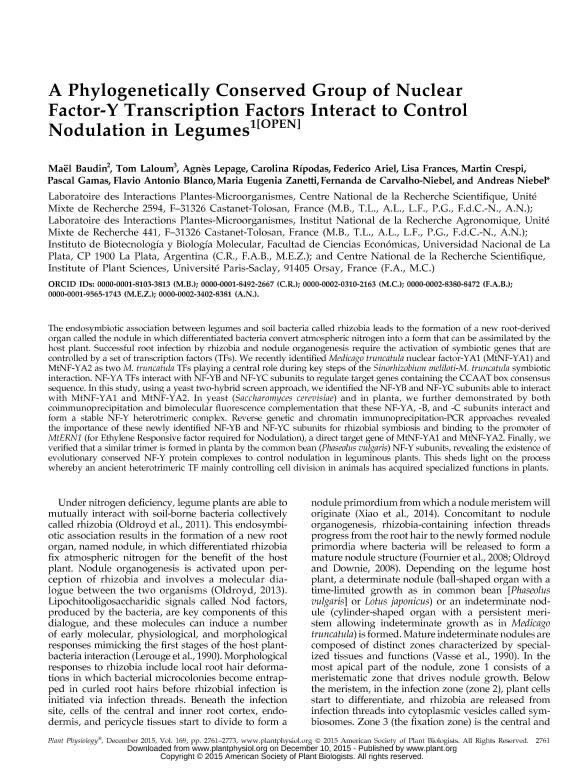Artículo
A phylogenetically conserved group of NF-Y transcription factors interact to control nodulation in legumes
Baudin, Maël; Laloum, Tom; Lepage, Agnes; Rípodas, Carolina ; Ariel, Federico Damian
; Ariel, Federico Damian ; Frances, Lisa; Crespi, Martin; Gamas, Pascal; Blanco, Flavio Antonio
; Frances, Lisa; Crespi, Martin; Gamas, Pascal; Blanco, Flavio Antonio ; Zanetti, María Eugenia
; Zanetti, María Eugenia ; de Carvalho-Niebel, Fernanda; Niebel, Andreas
; de Carvalho-Niebel, Fernanda; Niebel, Andreas
 ; Ariel, Federico Damian
; Ariel, Federico Damian ; Frances, Lisa; Crespi, Martin; Gamas, Pascal; Blanco, Flavio Antonio
; Frances, Lisa; Crespi, Martin; Gamas, Pascal; Blanco, Flavio Antonio ; Zanetti, María Eugenia
; Zanetti, María Eugenia ; de Carvalho-Niebel, Fernanda; Niebel, Andreas
; de Carvalho-Niebel, Fernanda; Niebel, Andreas
Fecha de publicación:
10/2015
Editorial:
American Society of Plant Biologist
Revista:
Plant Physiology
ISSN:
0032-0889
Idioma:
Inglés
Tipo de recurso:
Artículo publicado
Clasificación temática:
Resumen
The endosymbiotic association between legumes and rhizobia leads to the formation of root nodules in which differentiated bacteria convert atmospheric nitrogen into a form that can be assimilated by the host plant. Successful root infection by rhizobia and nodule organogenesis require the activation of symbiotic genes that are controlled by a set of early transcription factors (TFs). MtNF-YA1 and MtNF-YA2 are two TFs playing partially redundant functions during several steps of the symbiotic interaction between Medicago truncatula and Sinorhizobium meliloti. NF-Y proteins are part of a transcriptional complex composed of three proteins (NF-YA, NF-YB and NF-YC) which bind DNA at CCAAT-boxes, a motif present in most eukaryotic promoters. In plants, each subunit is encoded by small gene families, potentially leading to a multitude of heterotrimeric NF-Y complexes. Here, using yeast two hybrid screenings, we identified the MtNF-YB and MtNF-YC subunits that interact with MtNF-YA1 and A2. Further, we confirmed, both in yeast and in planta, the formation of trimeric NF-Y complexes and showed that these complexes are functional during nodulation using reverse genetic approaches and ChIP-PCR. Finally, as orthologs of the characterized NF-Y subunits also control nodulation in other legumes, we showed in common bean that similar NF-Y trimers could form in planta. Our results suggest that we have identified a group of evolutionary conserved NF-Y proteins that interact to control nodulation in leguminous plants.
Palabras clave:
Transcription Factors
,
Nodulation
,
Medicago
,
Symbiosis
Archivos asociados
Licencia
Identificadores
Colecciones
Articulos(IBBM)
Articulos de INST.DE BIOTECNOLOGIA Y BIOLOGIA MOLECULAR
Articulos de INST.DE BIOTECNOLOGIA Y BIOLOGIA MOLECULAR
Citación
Baudin, Maël; Laloum, Tom; Lepage, Agnes; Rípodas, Carolina; Ariel, Federico Damian; et al.; A phylogenetically conserved group of NF-Y transcription factors interact to control nodulation in legumes; American Society of Plant Biologist; Plant Physiology; 169; 10-2015; 2761-2773
Compartir
Altmétricas



